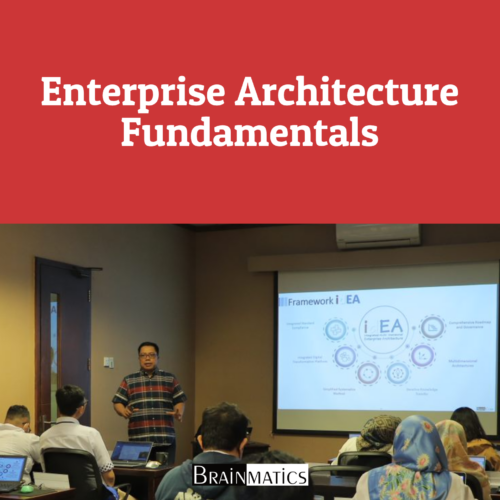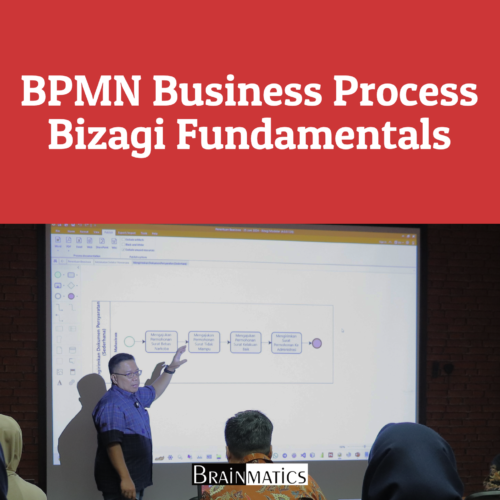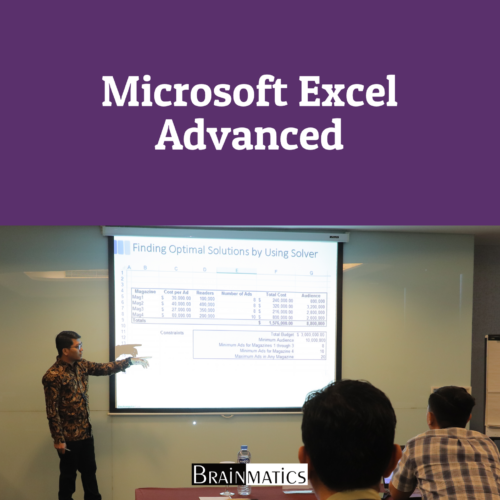![]() Enterprise Architecture Foundation Exam Guide adalah course yang dirancang untuk memberikan pemahaman dasar tentang konsep, prinsip, dan framework arsitektur perusahaan (Enterprise Architecture/EA). Dalam course ini, peserta akan mempelajari bagaimana EA membantu organisasi dalam menyelaraskan strategi bisnis dengan teknologi informasi, serta bagaimana berbagai framework seperti TOGAF, Zachman, dan FEAF digunakan untuk merancang dan mengelola arsitektur perusahaan secara efektif.
Enterprise Architecture Foundation Exam Guide adalah course yang dirancang untuk memberikan pemahaman dasar tentang konsep, prinsip, dan framework arsitektur perusahaan (Enterprise Architecture/EA). Dalam course ini, peserta akan mempelajari bagaimana EA membantu organisasi dalam menyelaraskan strategi bisnis dengan teknologi informasi, serta bagaimana berbagai framework seperti TOGAF, Zachman, dan FEAF digunakan untuk merancang dan mengelola arsitektur perusahaan secara efektif.
Course ini mencakup elemen-elemen utama EA, termasuk domain arsitektur bisnis, data, aplikasi, dan teknologi. Peserta akan memahami bagaimana arsitektur yang baik dapat meningkatkan efisiensi operasional, mempercepat transformasi digital, serta memastikan bahwa investasi TI selaras dengan kebutuhan bisnis jangka panjang. Selain teori, course ini juga mencakup studi kasus dan latihan ujian untuk membantu peserta mempersiapkan sertifikasi Enterprise Architecture Foundation dengan lebih percaya diri.
Dengan mengikuti course ini, peserta akan mendapatkan keterampilan dasar dalam menganalisis, merancang, dan mengelola arsitektur perusahaan di berbagai industri. Course ini sangat cocok bagi profesional TI, manajer proyek, analis bisnis, serta pemimpin organisasi yang ingin memahami bagaimana EA dapat digunakan untuk mendukung inovasi dan meningkatkan kinerja organisasi. Setelah mengikuti course ini, peserta akan lebih siap untuk mengikuti ujian sertifikasi serta menerapkan konsep EA dalam lingkungan kerja mereka.
OBJECTIVES
1. Memahami konsep dasar Enterprise Architecture (EA)
2. Memahami metodologi pengembangan EA
3. Memahami dasar tahapan-tahapan dan teknik pada Architecture Development Method (ADM)
4. Memahami soal latihan pada ujian sertifikasi Enterprise Architecture Foundation Part 1
AUDIENCE
1. Chief Information Officer
2. Enterprise Architect
3. Project Manager
4. Manager
5. IT Manager
6. Business Analyst
7. Systems Analys
PREREQUISITES
Menguasai Materi Enterprise Architecture Fundamentals
CONTENT
1. Introduction
1.1. Key Learning Points
1.2. The Open Group Certification for People Program
1.3. The TOGAF Certification Portfolio
1.4. TOGAF Enterprise Architecture Foundation
1.5. Preparing for the Examination
2. Concepts
2.1. Key Learning Points
2.2. What is an Enterprise?
2.3. The Purpose of Enterprise Architecture
2.4. The Key Benefits of Enterprise Architecture
2.5. What is the TOGAF Standard?
2.6. A Framework for Enterprise Architecture
2.7. Architecture Domains in the TOGAF Standard
2.8. Architecture Abstraction in Enterprise Architecture
2.9. The Enterprise Continuum
2.10. Architecture Repository
2.11. TOGAF Content Framework and Enterprise Metamodel
2.12. Architecture Capability
2.13. Risk Management
2.14. Gap Analysis
3. Terminology
3.1. Key Learning Points
3.2. Terms and Definitions
4. Introduction to the ADM
4.1. Key Learning Points
4.2. The TOGAF ADM and its Phases
4.3. Draft and Approved Deliverables
4.4. Iteration and the ADM
4.5. Governing Enterprise Architecture
4.6. Scoping an Architecture
4.7. Architecture Alternatives and Trade-Off
4.8. The Preliminary Phase
4.9. Phase A
4.10. Phases B, C, and D
4.11. Phases E and F
4.12. Phases G and H
4.13. Requirements Management
4.14. Information Flow and the TOGAF ADM
4.15. Agile Software Development
5. ADM Techniques
5.1. Key Learning Points
5.2. Supporting Guidelines and Techniques
5.3. Architecture Principles
5.4. Business Scenarios
5.5. Gap Analysis
5.6. Interoperability
5.7. Business Transformation Readiness Assessment
5.8. The Characteristics of Risk Management
6. Applying the ADM
6.1. Key Learning Points
6.2. How to Apply the TOGAF Standard
6.3. Iteration within the ADM
6.4. The Architecture Landscape
6.5. Partitioning
6.6. Purposes of Architecture
6.7. The Digital Enterprise
7. Architecture Governance
7.1. Key Learning Points
7.2. Introduction to Governance
7.3. Architecture Governance
7.4. The Benefits of Architecture Governance
7.5. The Role of an Architecture Board
7.6. Architecture Contracts
7.7. Architecture Compliance
8. Architecture Content
8.1. Key Learning Points
8.2. Concepts and Definitions
8.3. Building Blocks
8.4. Deliverables
Course Features
- Lectures 11
- Quizzes 29
- Duration 24 hours
- Skill level All levels
- Language Indonesia
- Students 27
- Certificate Yes
- Assessments Yes
Online
- Start Date 8 September 2025
- End Date 10 September 2025
- Cost Rp 5.900.000,-
- Registered 0 Person
- Confirmed 0 Person Daftar
Offline
- Start Date 8 September 2025
- End Date 10 September 2025
- Cost Rp 6.900.000,-
- Registered 0 Person
- Confirmed 0 Person Daftar








